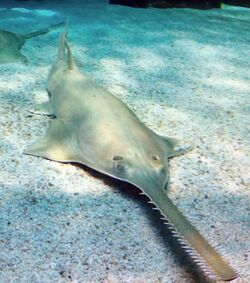Biology:Pristis
| Pristis | |
|---|---|

| |
| Pristis pristis | |

| |
| Pristis zijsron | |
| Scientific classification | |
| Domain: | Eukaryota |
| Kingdom: | Animalia |
| Phylum: | Chordata |
| Class: | Chondrichthyes |
| Subclass: | Elasmobranchii |
| Superorder: | Batoidea |
| Order: | Rhinopristiformes |
| Family: | Pristidae |
| Genus: | Pristis Linck, 1790 |
Pristis is a genus of sawfish of the family Pristidae. These large fish are found worldwide in tropical and subtropical regions in coastal marine waters, estuaries, and freshwater lakes and rivers.[3] Sawfish have declined drastically and all species are considered critically endangered today.[4][5]
Taxonomy
The scientific genus name Pristis is derived from the Greek word for saw.[6]
Living species
Recent authorities recognize four species:[4][5][7][8]
- Pristis clavata Garman, 1906 — dwarf sawfish, Queensland sawfish
- Pristis pectinata Latham, 1794 — smalltooth sawfish
- Pristis pristis (Linnaeus, 1758) — largetooth sawfish, common sawfish, freshwater sawfish, Leichhardt's sawfish
- Pristis zijsron Bleeker, 1851 — longcomb sawfish, green sawfish
These are divided into two species groups. Most are considered a part of the smalltooth group, except P. pristis which is the sole member of the largetooth group.[9] Two additional species, P. microdon and P. perotteti, have historically been recognized, but in 2013 it was shown that they are conspecific with P. pristis as morphological and genetic differences are lacking,[9] leading recent authorities to treat them as synonyms.[5][7][8][10][11][12] Anoxypristis cuspidata was formerly included in Pristis, but it has a number of distinctive features (for example, no teeth on the basal quarter of the saw) and recent authorities place it in its own genus.[3][5][7]
Extinct species
According to Fossilworks, extinct Pristis species only known from fossil remains include:[13]
- Pristis acutidens Agassiz 1843
- Pristis amblodon Cope 1869
- Pristis aquitanicus Delfortrie 1871
- Pristis atlanticus Zbyszewski 1947
- Pristis bisulcatus Agassiz 1843
- Pristis brachyodon Cope 1869
- Pristis brayi Casier 1949
- Pristis caheni Dartevelle and Casier 1959
- Pristis contortus Dixon 1850
- Pristis curvidens Leidy 1855
- Pristis dubius Münster 1846
- Pristis ensidens Leidy 1855
- Pristis fajumensis Stromer 1905
- Pristis hastingsiae Agassiz 1843
- Pristis lanceolatus Jonet 1968
- Pristis lathami Galeotti 1837
- Pristis olbrechtsi Dartevelle and Casier 1959
- Pristis pectinatus Latham 1794
- Pristis pickeringi Case 1981
- Pristis prosulcatus Stromer 1905

However, among this list are some species considered invalid by recent authorities and others now generally recognized as belonging in Anoxypristis.[1][14][15] Fossil Pristis range from the Late Paleocene to the Quaternary period.[1][2] Fossils have been found all over the world.[13]
References
- ↑ 1.0 1.1 1.2 Wueringer, B.E.; L. Squire Jr.; S.P. Collin (2009). "The biology of extinct and extant sawfish (Batoidea: Sclerorhynchidae and Pristidae)". Rev Fish Biol Fisheries 19 (4): 445–464. doi:10.1007/s11160-009-9112-7.
- ↑ 2.0 2.1 Cicimurri, D.J. (2009). "A Partial Rostrum of the Sawfish Pristis lathami Galeotti, 1837, from the Eocene of South Carolina". Journal of Paleontology 81 (3): 597–601. doi:10.1666/05086.1.
- ↑ 3.0 3.1 Peter R. Last, ed (2016). Rays of the World. CSIRO. pp. 59–66. ISBN 978-0-643-10914-8.
- ↑ 4.0 4.1 "Pristis". International Union for Conservation of Nature, Red List of Threatened Species. 14 November 2017. http://www.iucnredlist.org.
- ↑ 5.0 5.1 5.2 5.3 Nicholas K. Dulvy; Lindsay N. K. Davidson; Peter M. Kyne; Colin A. Simpfendorfer; Lucy R. Harrison; John K. Carlson; Sonja V. Fordham (2014). "Ghosts of the coast: global extinction risk and conservation of sawfishes". Aquatic Conserv: Mar. Freshw. Ecosyst. 26 (1): 134–153. doi:10.1002/aqc.2525. https://researchonline.jcu.edu.au/37738/6/37738%20Dulvy%20et%20al%202016.pdf.
- ↑ "Largetooth Sawfish". University of Florida. April 2012. https://www.floridamuseum.ufl.edu/fish/discover/species-profiles/pristis-perotteti/.
- ↑ 7.0 7.1 7.2 "Catalog of Fishes". California Academy of Sciences. 1 November 2017. http://researcharchive.calacademy.org/research/ichthyology/catalog/fishcatmain.asp.
- ↑ 8.0 8.1 Last, P.R.; De Carvalho, M.R.; Corrigan, S.; Naylor, G.J.P.; Séret, B.; Yang, L. (2016). "The Rays of the World project - an explanation of nomenclatural decisions". Rays of the World: Supplementary Information. CSIRO Special Publication. pp. 1–10. ISBN 978-1-4863-0801-9.
- ↑ 9.0 9.1 Faria, V. V.; McDavitt, M. T.; Charvet, P.; Wiley, T. R.; Simpfendorfer, C. A.; Naylor, G. J. P. (2013). Species delineation and global population structure of Critically Endangered sawfishes (Pristidae). Zoological Journal of the Linnean Society 167: 136–164. doi:10.1111/j.1096-3642.2012.00872.x.
- ↑ Espinoza, M.; Bonfil-Sanders, R.; Carlson, J.; Charvet, P.; Chevis, M.; Dulvy, N.K.; Everett, B.; Faria, V. et al. (2022). "Pristis pristis". IUCN Red List of Threatened Species 2022: e.T18584848A58336780. doi:10.2305/IUCN.UK.2022-2.RLTS.T18584848A58336780.en. https://www.iucnredlist.org/species/18584848/58336780. Retrieved 14 October 2023.
- ↑ "Pristis pristis — Freshwater Sawfish, Largetooth Sawfish, River Sawfish, Leichhardt's Sawfish, Northern Sawfish". 2017. http://www.environment.gov.au/cgi-bin/sprat/public/publicspecies.pl?taxon_id=66182.
- ↑ "Pristis pristis". shark-references.com. http://shark-references.com/species/view/Pristis-pristis.
- ↑ 13.0 13.1 Fossilworks
- ↑ Martien J P. Van Oijen; Vicente Faria; Matthew T. McDavitt (2007). "The curious holotype of Pristis dubius Bleeker, 1852 and the unravelling of Bleeker's sawfish taxonomy". Raffles Bulletin of Zoology 14: 37–49.
- ↑ "Introduction". Fossil Sawfish. http://www.fossilsawfish.com/index.html.
Wikidata ☰ Q683945 entry
 |

